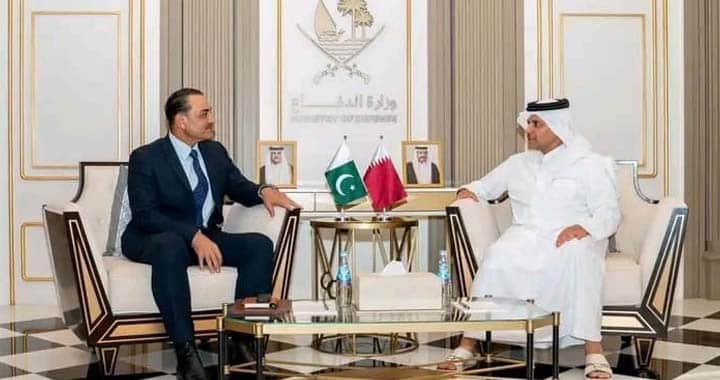Pakistan’s Chief of Army Staff, Field Marshal Asim Munir, met with Qatar’s Deputy Prime Minister and Minister of State for Defence, His Excellency Sheikh Saud bin Abdulrahman bin Hassan Al Thani, during an official visit to Qatar, amid heightened regional tensions following a reported Israeli airstrike in Doha targeting senior Hamas leadership.
During the high-level meeting, the two sides discussed matters of mutual interest, with a particular focus on expanding bilateral defence cooperation. They also exchanged views on evolving regional and international developments. Senior officials from both countries were present at the meeting.
The visit takes place just days after unconfirmed reports emerged of a precision Israeli strike in the Qatari capital, allegedly killing several top Hamas figures, including Khalil al-Hayya, Mohammed Darwish, Mousa Abu Marzouk, Hussam Badran, Khaled Mashal, and Zaher Jabarin. While Doha has not issued an official confirmation, the incident has sent shockwaves through the region and intensified scrutiny on Qatar’s role as a mediator and host of Hamas’s political bureau.
Hamas leadership was reportedly in deliberations over a U.S.-backed ceasefire proposal, initially introduced by former President Donald Trump during private negotiations. The strike, if verified, would mark a major escalation in Israel’s regional posture and could significantly reshape diplomatic dynamics in the Gulf.
Against this backdrop, Field Marshal Munir’s engagement with Qatari leadership is seen as both a reaffirmation of strong defence ties between Islamabad and Doha, and a strategic gesture aimed at regional stability. Pakistan has historically maintained a balanced stance in Middle Eastern affairs, often leveraging its military diplomacy to navigate complex regional fault lines.
Observers note that Pakistan’s outreach to Gulf allies gains renewed relevance in light of the emerging threats to sovereignty, the shifting security architecture in the Middle East, and rising tensions following Israel’s expanding operational footprint.
Further details on any joint security initiatives or diplomatic outcomes from the visit have not yet been disclosed.





